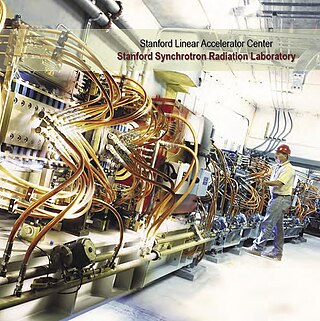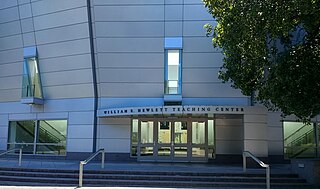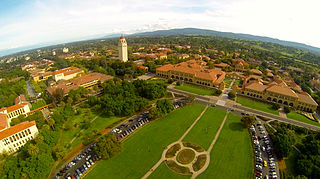Knowledge Systems Laboratory (KSL) was an artificial intelligence research laboratory within the Department of Computer Science at Stanford University until 2007, located in the Gates Computer Science Building, Stanford. Work focused on knowledge representation for shareable engineering knowledge bases and systems, computational environments for modelling physical devices, architectures for adaptive intelligent systems, and expert systems for science and engineering. KSL had projects with Stanford Medical Informatics (SMI), the Stanford Artificial Intelligence Lab (SAIL), the Stanford Formal Reasoning Group (SFRG), the Stanford Logic Group, and the Stanford Center for Design Research (CDR).
The Stanford Graduate School of Business is the graduate business school of Stanford University, a private research university in Stanford, California. For several years it has been the most selective business school in the United States, admitting only about 6% of applicants.

The Cecil H. Green Library is the main library on the Stanford University campus and is part of the SUL system. It is named for Cecil H. Green.

Cecil Howard Green was a British-born American geophysicist, electrical engineer, and electronics manufacturing executive, who trained at the University of British Columbia and the Massachusetts Institute of Technology.

The Jasper Ridge Biological Preserve is a 483 hectares nature preserve and biological field station formally established as a reserve in 1973. The biological preserve is owned by Stanford University, and is located at 37.408°N 122.2275°W south of Sand Hill Road and west of Interstate 280 in Portola Valley, San Mateo County, California. It is used by students, researchers, and docents to conduct biology research, and teach the community about the importance of that research. The preserve encompasses Jasper Ridge and Searsville Lake and the upper reaches of San Francisquito Creek, along with the latter's Corte Madera Creek and Bear Creek tributaries.

The Stanford Synchrotron Radiation Lightsource, a division of SLAC National Accelerator Laboratory, is operated by Stanford University for the Department of Energy. SSRL is a National User Facility which provides synchrotron radiation, a name given to electromagnetic radiation in the x-ray, ultraviolet, visible and infrared realms produced by electrons circulating in a storage ring at nearly the speed of light. The extremely bright light that is produced can be used to investigate various forms of matter ranging from objects of atomic and molecular size to man-made materials with unusual properties. The obtained information and knowledge is of great value to society, with impact in areas such as the environment, future technologies, health, biology, basic research, and education.
The Center for Advanced Study in the Behavioral Sciences (CASBS) is an interdisciplinary research lab at Stanford University that offers a residential postdoctoral fellowship program for scientists and scholars studying "the five core social and behavioral disciplines of anthropology, economics, political science, psychology, and sociology".

The Gates Computer Science Building, or Gates building for short, is an L-shaped building that houses the Computer Science Department as well as the Computer Systems Laboratory at 353 Jane Stanford Way, Stanford University, California. Construction on the building began in 1994 and was completed in 1996 at a cost of $36 million. It was named after Microsoft founder Bill Gates, who donated $6 million for the building's construction.

Sequoia Hall is the home of the Statistics Department on the campus of Stanford University in Stanford, California.

Braun Music Center is a music education building at Stanford University in California.

Designed by Spencer Associates in 1986 and funded by a donation from Elaine Sweet, Sweet Hall is a four-story building at Stanford University designed to consolidate undergraduate services, Stanford Overseas Studies, and the Undergraduate Advising and Research Center.

The William R. Hewlett Teaching Center is a building at Stanford University in California, United States named for William R. Hewlett, co-founder of Hewlett-Packard.

The James H. Clark Center at Stanford University, California, United States, is a building, completed in 2003, that houses interdisciplinary research in the biological sciences.

Lane Medical Library is the library of the Stanford University School of Medicine at Stanford University, near Palo Alto, California. Its mission is to "accelerate scientific discovery, clinical care, medical education and humanities through teaching, collaboration, and delivery of biomedical and historical resources". It is located on campus adjacent to Stanford Hospital and Clinics. In addition to books, journals and documents for medical research and the teaching and practice of medicine, Lane Library houses a significant collection of material relating to the history of medicine. The library also provides specialized search capabilities, classes and tutorials, writing and grant support, and group and individual study spaces.

The Queen Anne Hotel is a hotel in San Francisco, on Sutter Street. The hotel is a historic 1890 Victorian mansion, in the namesake Queen Anne architectural style, and decorated in the painted lady style. It was originally a girl's boarding school. It narrowly survived the 1906 San Francisco earthquake.
The PULSE Institute (PULSE) is an independent laboratory of Stanford University, founded in 2005 for the purpose of advancing research in ultrafast science, with particular emphasis on research using the Linac Coherent Light Source at the SLAC National Accelerator Laboratory. Recent research programs include Terahertz radiation ultrafast studies and attosecond pulse studies. It is housed in the Central Laboratory on the grounds of SLAC, and also utilizes some laboratory space on the main Stanford campus nearby. Philip H. Bucksbaum was named as the first director of PULSE. In 2019 David A. Reis became the PULSE director.

The Lathrop Library is one of several libraries at Stanford University in California. It is the current undergraduate library and houses the East Asia Library. Part of the Stanford University Libraries system, it opened on September 15, 2014 and houses collections and services formerly located in J. Henry Meyer Memorial Library, which was demolished in 2015. The library is located in a renovated building formerly occupied by the Stanford Graduate School of Business.

The Oval is an oval-shaped sunken lawn on the Stanford University campus in Stanford, California, United States.
















